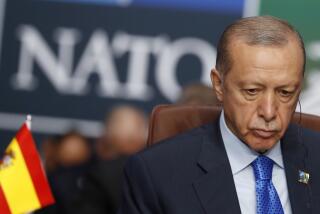Despite Reforms, Torture Claims Persist in Turkey
- Share via
ISTANBUL, Turkey — The alleged torture here of a young man arrested for stealing a car this year was representative of the Old Turkey. Police jolted his body with electricity, he claimed, suspended him by his arms and pounded his genitals.
The investigation of the case was part of the New Turkey, at least initially. After the February arrest, the man, identified by his initials, A.C., enlisted the services of a lawyer who helped him publicly denounce the treatment by police, something that might not have happened in the past.
And then the Old Turkey intervened. A few weeks ago, with international attention growing, the man dropped his allegations and has refused to continue with the case after out-of-uniform police stalked and threatened him, his advocates said.
Ending torture is a key and still unfulfilled requirement in Turkey’s bid to join the European Union, the 25-nation bloc that is expected to issue its formal invitation today to begin membership talks.
Prime ministers meeting in Brussels on Thursday agreed on Oct. 3 as a proposed date to start talks; the only sticking points involved conditions to be set and whether Turkey, a Muslim country of nearly 70 million people, would accept them.
In its quest to become a full-fledged member of the European community, Turkey has made remarkable strides in rewriting its laws to better protect human rights. A sweeping new criminal code was approved by parliament last week, a fresh openness is evident in airing allegations of abuse, and government-sanctioned, systematic torture is widely regarded to have ended. Yet incidents appear to persist, and the reluctance to investigate is acute, especially at the local and regional levels of government, where most of the abuse is reported to occur.
In September in the Kurdish southeast, for example, a third of all people detained said they were tortured, according to the Turkish Human Rights Assn. About 700 people filed torture claims with the association in the first half of 2004.
In addition to eliminating torture, Turkey has been required by the EU to adopt reforms, including reducing the role of the military in government, recognizing cultural rights for such minorities as the Kurds, and changing laws that discriminated against women. Turkey also repealed the death penalty.
A report in October by the EU, echoed in a separate study by the United Nations, concluded that significant progress had been made in human rights but that reforms on paper were often ignored in rural jailhouses and illegal detention centers.
Turkish and international human rights activists say they find it particularly troubling that torture continues even though officials are keenly aware of the scrutiny on their institutions, including the judiciary, police and security services. The question on the minds of many here and in the EU is whether the reforms are simply a cosmetic effort to qualify Turkey for membership and will soon fade.
“The concern is about whether we are establishing something lasting and durable here,” said Jonathan Sugden, a Turkey researcher for the New York-based Human Rights Watch. “We’ve seen a general positive trend and some very upsetting backsliding.”
Despite their reservations, human rights advocates agree that Turkey should be allowed to join the EU, saying that it will cement and deepen the reforms.
Leyla Zana, a Kurdish activist and until recently Turkey’s most prominent female political prisoner, concurred.
“We have two paths ahead of us, but we have only one choice,” she said during a recent visit here by the European Parliament’s president. “This choice is walking undeterred on the path that leads to the EU and enlightenment.”
Zana’s case was often cited by critics of Turkey’s human rights record. She spent 10 years in prison, accused of membership in an outlawed separatist Kurdish group. The government, its eye on the EU, released her five years ahead of schedule in June.
In another bid to meet EU requirements, the government in 2001 established human rights boards throughout Turkey to handle allegations of police abuse.
But as the case of A.C. showed, the boards are toothless: They ignored medical evidence documenting his treatment and ultimately sent him back to the very police unit that allegedly tortured him, according to Human Rights Watch, which championed his case.
His lawyer, Gulizar Tuncer, said Thursday that despite the attention focused on the case, the alleged victim was dropping his charges and was in mental anguish after “sustained harassment” by police.
“He gave up after repeated threats from plainclothes policemen who kept coming to his house,” she said. “I called [one of the police officers] and asked why they were bothering him. He said it was none of my business and was very hostile.”
Turkish and international human rights activists say officials remain distrustful of lawyers, doctors and other civilian advocates making inquiries at police stations and jails. But until outside monitoring is permitted, the activists say, abuse will fester.
Turkey has finally made it legal to teach in Kurdish and now allows Kurdish-language television and radio broadcasts. And in a country where the powerful army has cast itself as the guardian of the state’s secular, democratic identity and has its own nefarious human rights record, the government has taken important steps to assert civilian control.
Education and health sectors this year were allotted larger portions of the budget than the military, and next year the army’s entire budget will be open to congressional scrutiny for the first time. Positions held by army generals on the state broadcasting board and the board of higher education were eliminated.
The army has staged four coups in as many decades, the most recent one in 1997. But it has publicly supported the EU bid and refrained from harsh criticism of the government. Aware of overwhelming public support for EU membership, the army is treading carefully and avoiding inflammatory statements because it does not want to be seen as the culprit if the EU negotiations go badly, senior officials said.
“There’s been a radical change in attitude in Turkey,” Yigil Alpogan, the secretary-general of the National Security Council, said in an interview in Ankara, the Turkish capital.
Alpogan, a career diplomat, is the first civilian to occupy a post previously held by army generals. The council is an advisory board of military men that was often seen as a parallel government.
Alpogan and other officials said they did not expect the army to pounce if the EU negotiations failed. But others note that the specter of a military or ultranationalist backlash lurks behind Turkey’s political struggles, especially in circles that do not trust Prime Minister Recep Tayyip Erdogan, a former Islamist.
“I can’t say that the army’s wings are clipped,” said Umit Cizre, an expert on the military at Ankara’s Bilkent University. “But the trend is there. The transition could take years.
“Everything the EU stands for goes against the military’s self-assigned mission as guardians of the state.”
Nihat Ozcan, a former army officer and strategic analyst, said the changes demanded by the EU in human, civil and political rights had served to bring both the army and Erdogan in line with democratic standards and given reformers cover. But it remains a fragile dynamic.
“The EU process has been the glue that keeps Turkey’s disparate factions together,” he said. “Remove the glue ... and you’ll see fresh polarization in the country, and that will create room for violent groups and instability.”
More to Read
Sign up for Essential California
The most important California stories and recommendations in your inbox every morning.
You may occasionally receive promotional content from the Los Angeles Times.














